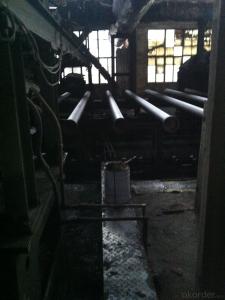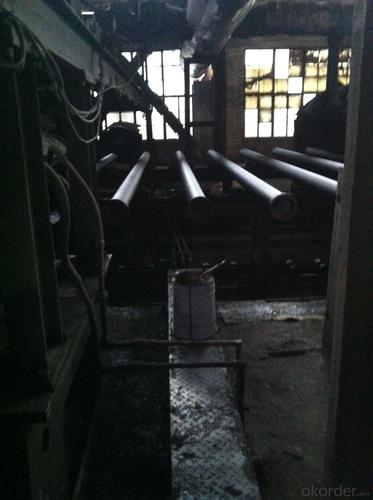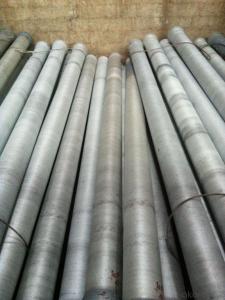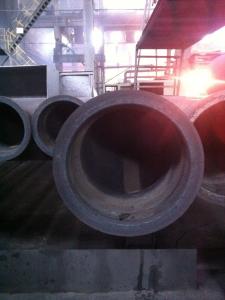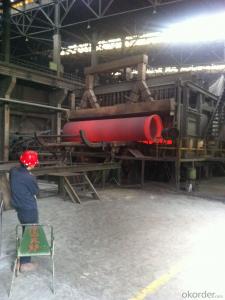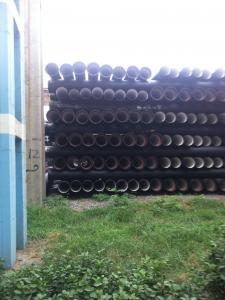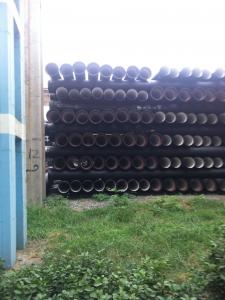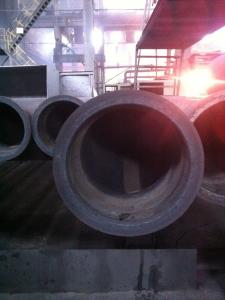DUCTILE IRON PIPES AND PIPE FITTINGS K9 CLASS DN500
- Loading Port:
- Tianjin
- Payment Terms:
- TT OR LC
- Min Order Qty:
- 22 pc
- Supply Capability:
- 3000 pc/month
OKorder Service Pledge
OKorder Financial Service
You Might Also Like
Material : Ductile Cast Iron
Size Range : DN 80mm to DN 2000mm
Unit Effective Length : 6m or 5.7m
Manufacture Standard: ISO 2531:1998/ EN 545:2006/EN 598:2007
Annual capacity : 200,000 tons
Coating Exterior: Zinc 130g/m2 according to ISO 8179-1 and bitumen coating 70 microns.
Cement Interior: Portland Cement/ High Alumina Cement/ Sulphate Resisting Cement Lining according to ISO 4179
Special requirements on external coating and internal lining can be applied
We also provide accessories such as SBR/EPDM rubber gaskets, lubricant paste, pipe caps, PE sleeves, etc.
Additional Parts:
Each pipe is strictly inspected according to related standard to ensure permanently high performance.
Easy Installation at site and service free for life
Long Service Lifespan
Quotation will arrive you within 24hours once we get your inquiry.
We guarantee offering you a competitive price.
A copy of original inspection reports of pipes will be offered after shipment.
Photos of loading process will be sent to the customer after shipment effect.
We will follow-up the delivery progress after shipment effect and update to the customer on weekly basis.
- Q: Are ductile iron pipes prone to external corrosion?
- Yes, ductile iron pipes are prone to external corrosion.
- Q: What is the relationship between the installation direction of the ductile iron pipe and the direction of flow?
- The use of cast iron by adding more than 18 nodularizer, after centrifugal ductile cast iron machine high speed centrifugal cast pipe, called "ductile" (Ductile Cast Iron Pipes), referred to as ball pipe, ductile iron pipe and ductile iron pipe etc.. The utility model is mainly used for conveying water, and is an ideal choice for tap water pipes.
- Q: Does centrifugal cast iron pipe work well with lining cement? Will it scale and breed bacteria?
- The situation in use abroad seems. It is considered that the corrosion of the inner wall of the centrifugal centrifugal ductile iron pipe and the rupture of the pipe are easy to occur when the content of chloride ion exceeds 5O0PPm in the pipe laying environment. This is mainly because, because the cement paste protection layer is the late spraying construction, it is not good to combine with the prefabricated core tube. It often causes water or moisture to seep in and causes oxidation and corrosion of the prestressing steel bars, resulting in fracture. The adhesive interface between cement mortar and centrifugally cast iron pipe is not reasonable. Because of the water absorption of cement, when the water enters the pipe, it is easy to destroy the interface and corroded the inner wall of the centrifugally cast iron pipe. Because it is a brittle material, it is easy to cause sudden accidents.
- Q: How are ductile iron pipes restrained against axial thrust forces?
- Axial thrust forces are effectively restrained in ductile iron pipes by utilizing both mechanical restraints and soil resistance. A commonly employed method involves the use of thrust blocks, which are concrete structures constructed at bends, tees, and other directional changes in the pipeline. These blocks are specifically designed to withstand axial forces and prevent any shifting or movement of the pipes caused by the pressure exerted by the flowing fluid. Furthermore, additional support and prevention of axial movement are achieved through the implementation of mechanical restraints, such as pipe restraints, thrust collars, and anchor blocks. Pipe restraints are devices installed around the pipe and connected to adjacent structures, such as walls or concrete collars, in order to prevent any sort of movement. Thrust collars, on the other hand, are utilized to absorb and distribute the thrust forces generated by the flowing fluid. These collars, typically made of ductile iron or steel, are securely fastened around the pipe to counteract axial movement. Moreover, soil resistance plays a crucial role in restraining axial thrust forces. The weight of the soil surrounding the pipe creates frictional resistance, which effectively counteracts the axial forces. In order to ensure effective soil resistance, it is vital to properly backfill the trench, compact the soil, and adequately embed the pipe in the soil. In conclusion, a comprehensive approach involving the use of mechanical restraints such as thrust blocks, pipe restraints, and thrust collars, along with the soil resistance provided by proper trench backfilling and compaction, is employed to restrain axial thrust forces in ductile iron pipes. This approach guarantees the secure placement of the pipes and their ability to withstand the axial forces exerted by the flowing fluid.
- Q: Are ductile iron pipes resistant to chemical attacks?
- Yes, ductile iron pipes are generally resistant to chemical attacks. Ductile iron is known for its high corrosion resistance, making it suitable for a wide range of applications including water and wastewater systems. Ductile iron pipes are typically lined with a protective coating such as cement mortar or epoxy to further enhance their resistance to chemical attacks. This lining acts as a barrier between the pipe material and the corrosive substances, preventing any degradation of the iron. However, it is important to note that the level of resistance can vary depending on the specific chemical being transported and the concentration and temperature of the solution. Therefore, it is always advisable to consult with experts or engineers to ensure the suitability of ductile iron pipes for specific chemical environments.
- Q: What are the meanings of cast iron pipe wall thicknesses LA, A and B respectively?
- You are mistaken in concept. The cast iron pipe is the sort of connection method. The ductile iron pipe is classified according to the material.
- Q: How is ductile iron different from cast iron?
- Ductile iron and cast iron are two iron alloys with varying compositions, properties, and uses. The primary distinction between the two lies in their microstructure and mechanical properties. Ductile iron, also known as spheroidal graphite iron or nodular cast iron, is a type of cast iron that undergoes an extra treatment process to enhance its strength and ductility. This is achieved by adding small amounts of magnesium to the molten iron during casting, resulting in the formation of graphite nodules throughout the material. These nodules act as stress raisers, preventing crack propagation and making ductile iron more resistant to fractures and more flexible compared to cast iron. In contrast, cast iron is an iron alloy with a higher carbon content than ductile iron. This higher carbon content leads to the formation of graphite flakes within the material, giving cast iron its characteristic brittleness. Due to its brittleness, cast iron is more prone to cracking and less flexible than ductile iron. However, cast iron exhibits excellent compressive strength and is highly resistant to wear and abrasion, making it suitable for applications where strength and durability are crucial, such as engine blocks, pipes, and manhole covers. Another difference between ductile iron and cast iron can be observed in their machinability. Ductile iron is generally easier to machine due to its lower carbon content and the presence of graphite nodules, which act as lubricants during the cutting process. On the other hand, the presence of graphite flakes in cast iron can cause tool wear and result in a poor surface finish during machining. In summary, ductile iron and cast iron differ in their microstructure, mechanical properties, and applications. Ductile iron offers improved ductility and fracture resistance, making it suitable for applications that require flexibility and impact resistance. Cast iron, with its higher carbon content and graphite flakes, provides excellent compressive strength and wear resistance, making it ideal for applications that demand strength and durability.
- Q: Why does the cast iron pipe always run off when testing?
- If the pipe is exposed for pressure test, you must add a pier, or else the fittings fly out. You are not surprised. At the same time, the pressure test before the ink tube to make full immersion bubble discharge clean, or a big easy gas pressure pipe explosion.
- Q: Is the crankshaft material forged or ductile iron?
- Nodular cast iron, cast iron, forged steel crankshaft are used in the three. There are 3 kinds of axes in our company
- Q: Ductile iron and gray iron is what are the advantages and disadvantages of it
- Comparison of ductile iron and cast iron (gray iron)Compared with cast iron, ductile iron has an absolute advantage in strength. The tensile strength of ductile iron is 60K, while the tensile strength of cast iron is only 31k. The yield strength of ductile iron is 40K, while the cast iron does not show yield strength, and eventually breaks. The strength to cost ratio of ductile iron is far superior to that of cast iron. Ductile iron is the same as cast iron in corrosion resistance.
Send your message to us
DUCTILE IRON PIPES AND PIPE FITTINGS K9 CLASS DN500
- Loading Port:
- Tianjin
- Payment Terms:
- TT OR LC
- Min Order Qty:
- 22 pc
- Supply Capability:
- 3000 pc/month
OKorder Service Pledge
OKorder Financial Service
Similar products
Hot products
Hot Searches
Related keywords
